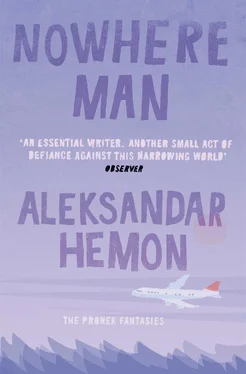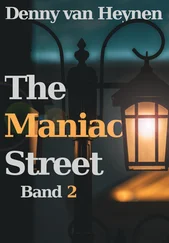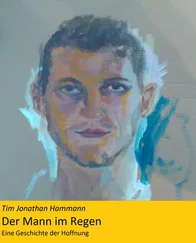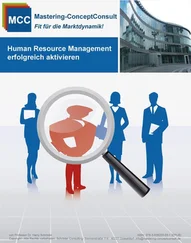“It’s a great song.”
“Sorry, cowboy.” JFK cleared his throat. “Oak Ridge was built under a cloak of great secrecy during World War Two. It was part of the Manhattan Project. The plutonium they dropped on Hiroshima and Nagasaki came from Oak Ridge. A hell of a lot of plutonium they put in warheads after the war came from Oak Ridge.”
“Can we stop to piss?” Dallas said.
“Now they produce who knows what. So there’ll be an action there, we’ll do a little demo, some might get arrested, the usual stuff.”
“I can’t get arrested,” Pronek said.
“Can we stop to piss?”
“Perhaps you can be quiet?” Vince said, with a deep tranquil voice.
They stopped.
It was still cold — cloudlets of steam escaped their mouths. Pronek smoked, trotting in place, his left hand in his pocket. A man in a fedora was sleeping in a decrepit Cadillac in the parking lot, his hat pulled over his eyes. Vince and JFK were in front of a vending machine in the rest-stop building. Rachel embraced herself, lifting her gaze toward the sky, as if expecting something to come down. Pronek looked up, and there was nothing but endless grayness.
“My grandfather worked at Oak Ridge,” Rachel said.
Pronek shook his head, disbelieving her to make her tell more. He stuck the cigarette in his mouth and put the other hand in his pocket.
Her grandfather, she said, survived Auschwitz. His entire family perished, except for an uncle who had moved to Chicago after World War I. Her grandfather was in his late twenties, but he looked older. He came to Chicago and stayed with his uncle, sharing a room with his two teenage cousins, boys who only cared about girls. They despised Rachel’s grandfather — he was skinny and rugged and exuded the scent of European death and sickness, the fetid refugee smell. They pegged their noses with their fingers when he walked in the room. He slept on their couch, and sometimes he would open his eyes and they would be leaning over him, sniggering. He left after a month — he had a biology degree and found a job in a butter factory. She imagined him walking between the vats of butter, Rachel said, his hands greasy, his heart soaked with sorrow.
“Let’s go,” JFK said.
He didn’t want to work in a butter factory. He wrote a letter to the University of Chicago. It was in broken English, but he managed to convey that he was a biologist and that he had studied with a famous scientist in Prague. He didn’t mention that he was an Auschwitz alumni, because he thought that they wouldn’t want to hire him.
“Where’s Dallas?” JFK asked them.
“He’s urinating,” Vince said.
“Right now,” Rachel said, “he’s holding in his hand what he likes most.”
They could see him at the far end of the parking lot, standing in the dry frozen grass up to his knees. He shook it off, zipped up, and ran toward them, flapping his arms as if flying.
“Why couldn’t you use the facilities like everybody else?” JFK grumbled.
“I’m Mother Nature’s son,” Dallas said.
“Well, Father Society might get you arrested and have your ass whupped,” Rachel said.
They filed into the van.
“I reject society,” Dallas said, “and its stupid rules.”
“Buckle up!” JFK ordered.
He got a letter from the University of Chicago and they offered him a job in the lab, studying the effects of radiation on living organisms. The person who offered him a job sent him back his letter with little grammar lessons in the margins. It was at the University of Chicago that he met her grandmother: she was an astronomy student, but worked part time as a secretary for the nuclear people. He asked her out and they went to the Aragon Ballroom, where he could not jitterbug or swing or whatever they danced, all he knew were waltzes and polkas. They fell head over heels in love. Rachel’s grandfather lived in a basement in Humboldt Park, and Grandmother lived with her parents, moral Hyde Park Jews, so all they could do was dance. Anyway he would go down to Oak Ridge. They would expose plants and mice to radiation, plutonium and isotopes and shit, and watch what would happen.
“Yeah,” JFK said, “there is an African-American community called Scarboro there, and they lived downstream from the lab, you know, kids swimming in a radioactive stream. Sometimes they’d let the steam out too. And they watched what would happen.”
“What happened?” Pronek asked.
“Oh, you know, the usual stuff, kids born without a spine, cancer, tumors.”
“Shit!” Dallas said.
“Proud to be American,” Vince said.
Rachel’s grandfather went down to Tennessee every once in a while with a driver, because he didn’t want to drive. He sat in the back seat writing letters to Grandma, describing the landscape and all his thoughts and all his love. They would stop somewhere and he would mail the letter, and start a new one immediately. It took them two or three days to get down there and she would get ten, fifteen letters. He would stain the letter with grease and write “Kentucky grease” below. He would send her flowers and dry tree leaves pressed in the envelope. When he saved up money, he bought a camera and had the boys at Oak Ridge develop the film and make photos and he’d send them to her — he wanted to be with her all the time, all the time.
Rachel had seen the letters: his English was bad, no articles, no tenses, scrambled sentences, but they were beautiful, she said, brimming with old-fashioned, old-worldly schmaltzy love.
—
They passed houses tiny on the horizon, and clouds above them, a shadowy curtain of rain hanging down. They passed furrowed fields and mall clusters with gas stations and McDonald’s and Subways, then the van would sink between hills and go up and down into valleys with vapid ponds. Pronek imagined writing letters to Rachel, describing these hills and how they reminded him of places in Bosnia.
He would do his experiments thinking of Grandma. In those days, they didn’t care much about radioactivity — in fact, until the day he died, his bones rotten, he claimed that radioactivity was harmless. Anyway, he would stir uranium in a pot, as if cooking, no masks or gloves, nothing, and he would be thinking of Grandma, her alabaster thighs and her gentle hands, whatever, and a drop of uranium would leap out of the pot and land on his lip, and he would just wipe it off.
Rachel moved her thumb across her lips, slowly, then licked them, while Pronek watched, mesmerized.
“Where did you get that corny shit?” Dallas said.
“Shut up!” Vince said.
The spot where the uranium drop fell burned and he wrote to Grandmother that his lips were burning to kiss her.
They drove through Kentucky, over high bridges spanning lumpy red and ochre hills. They drove through towns consisting of boarded-up houses and a Jiffy Lube shop. They drove past tranquil grazing horses, tall and lean, raising their heads to look into the distance, then moving, trot by trot, until they were galloping in circles enclosed by a white fence. Pronek imagined them rising and jumping over the fence, but then was afraid that they might break their legs landing.
“I have the friend,” Pronek said, “who likes horses very much. My best friend in Sarajevo.”
“Does he have a horse?” Rachel asked.
“I had a horse,” Dallas said. “My grandfather in Texas—”
“That’s nice,” Rachel said. “Except nobody asked you.”
“Oh, no, he doesn’t,” Pronek said. “But he always dreamed about the horses. I will show you his letter that he wrote me. It is very sad.”
“The letter he wrote you,” Rachel said.
“Right,” Pronek said.
“Not his letter that he wrote you.”
“Okay.”
“I noticed,” Dallas said, “that you use a lot of the’s.”
Читать дальше












